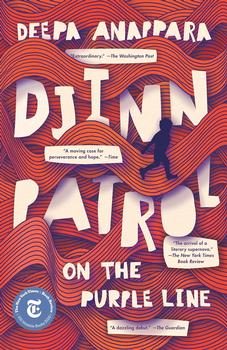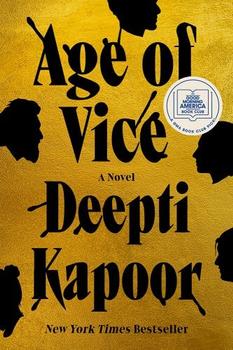Summary | Excerpt | Reviews | Beyond the book | Read-Alikes | Genres & Themes | Author Bio

In this transporting debut novel, three friends venture into the most dangerous corners of a sprawling Indian city to find their missing classmate.
Down market lanes crammed with too many people, dogs, and rickshaws, past stalls that smell of cardamom and sizzling oil, below a smoggy sky that doesn't let through a single blade of sunlight, and all the way at the end of the Purple metro line lies a jumble of tin-roofed homes where nine-year-old Jai lives with his family. From his doorway, he can spot the glittering lights of the city's fancy high-rises, and though his mother works as a maid in one, to him they seem a thousand miles away. Djinn Patrol on the Purple Line plunges readers deep into this neighborhood to trace the unfolding of a tragedy through the eyes of a child as he has his first perilous collisions with an unjust and complicated wider world.
Jai drools outside sweet shops, watches too many reality police shows, and considers himself to be smarter than his friends Pari (though she gets the best grades) and Faiz (though Faiz has an actual job). When a classmate goes missing, Jai decides to use the crime-solving skills he has picked up from TV to find him. He asks Pari and Faiz to be his assistants, and together they draw up lists of people to interview and places to visit.
But what begins as a game turns sinister as other children start disappearing from their neighborhood. Jai, Pari, and Faiz have to confront terrified parents, an indifferent police force, and rumors of soul-snatching djinns. As the disappearances edge ever closer to home, the lives of Jai and his friends will never be the same again.
Drawing on real incidents and a spate of disappearances in metropolitan India, Djinn Patrol on the Purple Line is extraordinarily moving, flawlessly imagined, and a triumph of suspense. It captures the fierce warmth, resilience, and bravery that can emerge in times of trouble and carries the reader headlong into a community that, once encountered, is impossible to forget.
Anappara's India lives and breathes on the page. Every tin-roofed hut, abandoned alleyway, and overcrowded bazaar fizzes with a richness of detail that could only be rooted in the author's intimate knowledge of her setting. Anappara earns her right to eschew any happy endings. In an India where as many as 180 children go missing every day, with the vast majority of cases remaining unsolved, the enthralling Djinn Patrol on the Purple Line is unafraid to lay bare the country's grim realities and entreats us to stop turning a blind eye...continued
Full Review
(798 words)
This review is available to non-members for a limited time. For full access,
become a member today.
(Reviewed by Dean Muscat).
While investigating a series of missing children taken from an unnamed Indian slum, Jai and his friends Pari and Faiz, the central protagonists in Djinn Patrol on the Purple Line, come across many pictures and iconography depicting Hindu gods. Here are some brief insights into the mythology surrounding a handful of these deities.
 Vishnu is one of the Hindu triumvirate alongside Brahma and Shiva. Known as the Trimūrti, these three gods are responsible for the creation, upkeep and destruction of the world. Vishnu is the protector of the universe and is said to restore the balance between good and evil. In Vaishnaism, the largest Hindu sect, he is considered to be the greatest god. Vishnu is commonly depicted in religious icons in ...
Vishnu is one of the Hindu triumvirate alongside Brahma and Shiva. Known as the Trimūrti, these three gods are responsible for the creation, upkeep and destruction of the world. Vishnu is the protector of the universe and is said to restore the balance between good and evil. In Vaishnaism, the largest Hindu sect, he is considered to be the greatest god. Vishnu is commonly depicted in religious icons in ...
This "beyond the book" feature is available to non-members for a limited time. Join today for full access.

If you liked Djinn Patrol on the Purple Line, try these:

The Djinn Waits a Hundred Years
by Shubnum Khan
Published 2025
"A dark and heady dream of a book" (Alix E. Harrow) about a ruined mansion by the sea, the djinn that haunts it, and a curious girl who unearths the tragedy that happened there a hundred years previous

by Deepti Kapoor
Published 2024
This is the age of vice, where money, pleasure, and power are everything, and the family ties that bind can also kill.
Show me the books he loves and I shall know the man...
Click Here to find out who said this, as well as discovering other famous literary quotes!